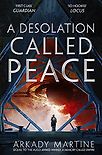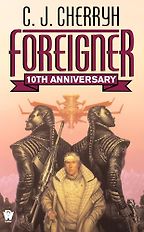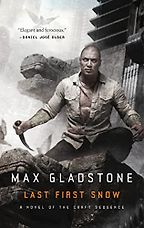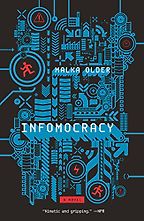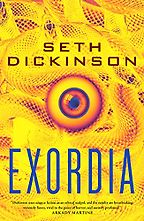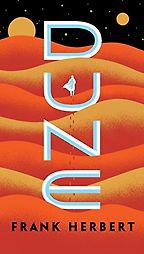For readers with an interest in politics, what does science fiction have to offer?
I’m going to talk about Anglophone science fiction here, because that is all I am strictly qualified to opine about!
I want to talk briefly about how science fiction became science fiction. Science fiction is sometimes called the literature of ideas. Originally, most of those ideas were strictly technological and Western. What if there were robots? What if there was teleportation? What if we could go faster than light? What if we had cryogenics? And so on… If you look at what is called the ‘golden age’ of sci fi, and much of the ‘silver age’, you have a real focus on an interesting technological gimmick or change that has occurred in the world, which the story then explores; and it can explore it in many different ways.
Then there’s a turn in the 1970s, which is threaded through current writing, and which I really respond to both as a reader and a writer. It’s the same notion of a ‘literature of ideas’ where you’re playing around with the technology, but thinking about a much wider version of technology – more like techne in the Greek sense: a craft or an art. And one of the biggest technes is politics: political life, how you arrange governments, what the government is supposed to do – government itself is a kind of technology. So when I think about political science fiction, I always think, what kinds of political technologies are there? What happens if you change them a bit? What kinds of stories can you tell about the world, or about politics, or about a whole emotional or sociological or technological situation? Not every science fiction book does this. But there’s a huge vein of it, that’s very deep.
You first choice has very alien political techne. Could you introduce us to Foreigner by C. J. Cherryh?
C. J. Cherryh is probably the author who has the most direct influence on me in the science fiction universe. There are other authors from other genres that have had a similar influence. But C. J. Cherryh is how I learned to write politics. Her work is enormously interested in both the structures of political systems – sometimes those are also military systems, or corporate systems – and the internal effects of those systems on character, on people. Those people are sometimes aliens, and sometimes humans.
Foreigner is the first book of a long series. I do suggest that if you want to read them, you read them in order; but this first one is totally standalone, you can just read that one by itself. It’s the story of a man named Bren Cameron. He is an ambassador from a stranded colony of humans to an alien civilization, the atevi, who live on the world that the humans have landed on. It’s really about Bren trying to figure out how atevi society works, where it matches up to human society – and where it really doesn’t.
He does this through a political lens because he’s working in a political situation: he’s an ambassador, and he’s dealing with heads of state in various ways. What he’s really doing is thinking about sociology, which to me is a political tool. Doing comparative sociology on the fly, live, is in many ways how all people involved in politics have to work – whatever system they’re working in, politics is made out of people. Frustratingly! I work professionally in politics myself, and this has become even clearer to me!
Foreigner is really about alienness, and mapping human techne of politics on to a completely different system, which has different emotional, economic and social triggers. Where that can go wrong, and where that can go right.
I’m interested in the idea that the political system impacts character. Is Cherryh starting from the idea that character is malleable?
Politics is a thing that can happen to a person. A person can also happen to politics, if it’s the right person. But as a writer, and also as a reader, I am very often looking for books that deal with the psychological impact of trying to work through a political event or system or goal, because it’s much larger than I think people sometimes imagine. It can be as impactful and as stressful as more kinetic forms of conflict.
It must be useful to have a well-informed outsider like an ambassador as your protagonist.
Yes. It helps a great deal, makes it easier – it’s a way of talking to the reader really, and bringing them with you.
Your own hero in A Memory Called Empire is an ambassador, and is caught up quickly in political machinations. Plot and political system are so tightly interwoven I’m curious as to which developed first.
I don’t separate things very much. I’m not very good at it! I trained as a historian originally, which means it’s very difficult for me not to consider everything to be interrelated. And I always feel slightly guilty admitting this, but I did not outline, and I didn’t really do a ton of planning, at least for the first half. I just wrote it.
Eventually it became an unwieldy object, and I had to sit down and figure out what I actually wanted to do. But nor am I really one of those discovery draft writers who writes a million words they don’t use… There’s just something very generative about trying to pile up interesting things as you go, without locking it down. It creates a simulation of the complexity of the real world. I doubt I could design something, just sitting down with me and a piece of paper, that would have the kind of fractal consequences that you can have by allowing a certain amount of… not random action, but undesignated action – undesignated as to what it’s for – into a plot.
Of course, the active experience of doing this feels like just throwing things at the wall. Eventually, it becomes a shape. I’ve described it as adding things to a supersaturated solution: eventually it will get crystals. And then you know what it is!
I went back into the first half of the book and added a great deal of scaffolding to get to what I eventually wanted. But the shape of what I eventually wanted was created by the confluence of everything that I had found interesting or desirable to write about. ‘Fun’ is the wrong word; ‘desirable’ is a question of what fascinations emerge from the process, what made it feel real.
Could you tell us what the book is about?
A Memory Called Empire is the first half of a two-book series, the Teixcalaan series. They are about an ambassador from a small space station, called Lsel Station, to the vast interstellar empire of Teixcalaan. We follow what happens to her when she first has to investigate the murder of her predecessor in her job, and then attempt to stop a genocidal war – or not!
They’re about assimilation. They’re about imperialism. They’re about languages. And they’re what I did instead of writing the book that was supposed to be the book of my postdoc, about Byzantine and Armenian history of the 11th century.
Let’s talk about your second political science fiction recommendation. Aliens are classic sci fi, but here we’re dealing with gods… Could you introduce Max Gladstone’s Last First Snow?
Last First Snow is the fourth book in Max Gladstone’s Craft sequence, but each of the books are standalone. This one is the earliest in the story, chronologically, and it is basically a book about zoning, generational trauma, and protest movements – which could describe a book that isn’t science fiction or fantasy at all. In fact, I read a non-sci-fi version of that book, and it’s awfully good when it’s written in the real world too. But Max does my favourite trick in speculative fiction, which is to take a very nasty real-world problem – which here is gentrification, and the destruction of a culture by an industrialised, corporatised culture, and police brutality – and get up really close to it, but make all of those things about a world that isn’t our world.
So it lets you get closer in still, and while you do think about the analogues in the world you live in, you don’t have to engage directly with any specific trauma. It’s a generalised trauma. This is a special trick – to take the interesting and horrific conflicts of the world we live in, and spin them sideways. I use it myself, and Max is an amazing practitioner of it.
This particular book has an in-world equivalent of high finance, and it is able to steals souls directly. Some of the magic is the in-world equivalent of weapons of mass destruction – things that would violate the Geneva Conventions, if they were real. When those are deployed against what had previously been a peaceful protest, what happens? The book also addresses questions like: if you were a political dissident or revolutionary when you were young, and now you are older – you didn’t win, and you now have a family – what do you owe the people who you were in that movement with? And what do you owe the people who you’ve built a life with afterwards?
Max does not answer that question, which I think is good, because I’m not sure it’s an answerable question. But he shows you one character asking the question and answering it for himself.
You mentioned the advantages of writing a fictionalised trauma rather than engaging with a real one. Could we drill down into that? Is it about reader reception, or what’s possible as a writer?
Both! I don’t think that it’s necessary to have experienced a trauma directly to do a good job of writing about that trauma. But you have to do a lot of work, really serious work, and talk to people who have experienced that.
But I’m mostly interested in the ability of the reader to not have a knee-jerk reaction; to not think that they already know what the story is going to say. No matter where you are politically or socially, or what part of the world you are from or live in, you have lots of those baked in present stories about conflicts and traumas that are currently extant or have existed in your lifetime or your generational memory. Moving the action to a fictional universe, but using the same concepts, triggers and horrors can shift a reader away from their own expectations, so that they can see a different or wider or stranger angle on a story.
Yes. You mentioned that there was a real-world title that you think covers the same topics as Last First Snow?
Yes, I read a lot of nonfiction about terrible things that have happened because of zoning codes. For people who want to read about that in the nonfiction space, I would recommend Lawrence T. Brown’s The Black Butterfly: The Harmful Politics of Race and Space in America. That’s about Baltimore and redlining.
Your next science fiction recommendation takes us to electoral politics: tell us about Infomocracy by Malka Older.
Infomocracy is a 2016 book, and it’s the first in Older’s trilogy, The Centenal Cycle. It’s set in a near-future real world, where nationalism and nation states have been primarily replaced by a new form of micro-democracy: a system where every 100,000 people elect a government. They’re very small and local, so you get a strange micro-democratic patchwork world. Of course, there are also nation states that have not agreed to adopt this new system. And there are people who aren’t beholden to any one bit of it, and move between them.
In Infomocracy, Malka explores what this kind of political system might be like to live in, and to run an election in. The first book is an election thriller, almost in the vein of a Michael Crichton or a Tom Clancy novel, which I love; it also owes a lot, I think, to William Gibson. Essentially, the micro-democracies are made possible by a new technology – or I guess, now not so new – which is a giant search engine that’s incredibly accurate, incredibly effective, and has an international team of people working to keep it that way. The omnipresence of this information network, which is called Information with a capital ‘I’, has spurred the creation of the micro-democracy system in some way which is undefined.
I think what Malka is really interested in is the question: in politics, who gets to decide what is real? The micro-democracy is an incredibly cool science fictional idea, but it’s less important than the considerations of narrative and truth-telling and persuasion that are woven all the way through the book, which are all older political techniques than democracy – either in the form we know it or in the form that Older imagines. The plot revolves around who’s telling the truth, why, and who believes them.
Of all the titles we’ve discussed, this feels the most like it’s extrapolating to somewhere we might end up.
Yes. It’s not a ‘here’s where we’re headed book’, nor is it quite a ‘here’s where we could go if we weren’t careful’ book. It’s more a ‘here is a thought experiment about a possible way the world could be different; you can see how we might approach it from here’. And that is, I think, the oldest science fiction trick in the book.
It’s fun to see a vision of localism that isn’t utopian.
Have you ever lived in a small town? It’s never utopian!
Your next political science fiction recommendation is also set in our own world, and roughly in our own time. Tell us about Seth Dickinson’s Exordia.
Exordia is set precisely in 2013. It’s a very recent book, it came out this year. It’s a political techno thriller with aliens – which does not make it sound nearly as horrific as it actually is. I want to tell everyone to read this book, and I want to tell everyone to go in with eyes wide open, because it is brutal. It’s also very funny! It’s not a slog to read at all. But it is a book about genocide, nuclear annihilation and other forms of civilisation-wide collapse. It is a book about making impossible moral choices. And there’s also some body horror that got even me, and I read and write horror! So be warned, and then go do it anyway, if you’re a person who feels like having that experience, because it is worth it.
The basic plot of Exordia is that the protagonist – or one of the protagonists – is a woman named Anna, who is a Kurdish expat living in America at the beginning of the story. She has had a truly traumatic childhood in some of the Kurdish-Iraqi wars, and she has survived her childhood, but very much not unscathed. She’s working a dead-end job in Manhattan, and she meets an alien in Central Park.
“I look for books that deal with the psychological impact of trying to work through a political event or system”
The alien is named Ssrin. Ssrin says, essentially, ‘I am your spiritual soulmate. We are linked together by destiny, and we are going to save the world.’ So far this sounds like the opening to an anime, and I think in some ways that Seth was thinking about that – but the story does not stay in that genre. It rapidly becomes a military thriller, in which both Anna and Ssrin end up back in Kurdistan, dealing with multiple nation states and their interests in Ssrin’s crash-landed ship, and what it might entail. There’s an opposing alien named Iruvage, who is also doing geopolitics.
The geopolitics are both the very everyday kind – negotiating with different ministers or cabinet secretaries or squad leaders in an army from China or Iran or the US or the local Kurdish groups – and metaphysical. This is a book that’s deeply concerned with existential value. Like, why is there existence instead of no existence? And why do people notice things instead of not noticing them? Those sound like very bedrock philosophical questions, and they are, but they’re also very much tied up with ideas of whether people, alien or human people, have free will – and what they should do with it if they do. I think that is the deepest question that Seth is playing with. He does it through this lens of really examining a conflict-ridden place in the real world. I know the degree of research and cultural work that Seth did to write this book, and I’m incredibly impressed by it.
I’m interested that we have an everyday protagonist here, rather than someone who set out to be involved in politics – is she well-suited to politics?
Oh, she’s not every day at all, actually. She is someone who was involved in military conflict at age eight. So she’s attempted to make herself into an everyday protagonist, but failed. One of the things I find very interesting about her is the amount of absolute relief she finds in bad things happening again. She knows how to operate in a world which is all high stakes, all existential crisis; she didn’t really have much operating capacity in a world where that’s not happening to her. She’s aware of that, a little – enough to be slightly worried. But not really enough to say no.
Oh, interesting! It’s a difficulty for me with political books – I’m interested in the political thought experiments, but I know I’d crumble in two seconds in these crisis situations, so I struggle to identify with the protagonists.
I’m not sure it says anything good about me, but I think I find it relatively easy to identify…!
Well, you do work in policy and activism yourself! You’re also a historian, and Dickinson’s background is in the social sciences; is this kind of thing common among political science fiction authors?
Yes, so: of the people I’ve listed so far… I’m not sure of C. J. Cherryh’s academic or professional background. But Max Gladstone lived and worked in China for a while, and did translation; and Malka Older worked in humanitarian aid, in Sri Lanka and Japan and some other places. Seth Dickinson is a sociologist, I’m a historian who now works in energy policy. I think there might be a type!
Let’s talk about your last choice. It almost needs no introduction, but nonetheless: please introduce us to Frank Herbert’s Dune.
I felt like it would be weird to leave this off a list of political science fiction, both because of the particular cultural moment that we’re in right now, where there is a successful new film adaptation of Dune and a lot of people are coming to this book for the first time, and because it is probably a deeply influential novel for many of the writers we have already talked about – including me.
Dune is a big sprawling space opera. It is explicitly a political book: it’s about a revolution to overthrow an oppressive emperor, but also about a conflict between two military families, and how they run extractive industries on planets. It’s also about religion. And it’s about trying to build better people through genetic or psychoactive means – all of which make a lot of sense when you think about who wrote it, and when he wrote it. Frank Herbert was writing in the milieu of MKUltra, and Edward Said’s Orientalism, and the first approaches for a lot of white Western writers to thinking about Islam as a cultural force.
There are many debates on the internet – and you can go look for them, if you like – about whether Frank Herbert did a good or bad job at approaching those issues. What I find more interesting is that he wrote something that had a lasting impact, both on what other kinds of science fiction have been written, and on what other books in the genre of political science fiction are responding to. The cultural impact is bigger than readers and writers in the genre, because Dune is one of the ones that escaped confinement and got out into the wider world.
It I read it probably far, far too young. I was maybe eleven, which is not the age I recommend reading Dune, unless you want to get a child like me – and I’m not really sure most parents want that. It’s hugely influential for me, as a writer, in terms of conceptualising complexity, and the way you can write a book about the moral injury of trying to work in geopolitics – about what kinds of psychologically horrific things can happen to a person, if they are trying to be a God Emperor, or trying to be a person with their hands on the wheel of fate. It’s very grandiose to say that, but in some ways that is what people who get into serious politics are trying to get their hands on – at least a very little wheel of fate. And Dune is not flinching about the things that happened to Paul Atreides, and the things that happened to his mother Jessica, and to Chani, and all the other people around him who are affected by the stone that he has thrown into the lake of the world.
It’s also a book that is unafraid of doing a huge amount of scale. I think that’s something that shows up a lot in the genre, in responses to Dune that have integrated it or thought about it or just said, “I want to write Dune again because it was cool, and I want to do that!” – the sense that you don’t have to focus down really tight, you can get intergalactic in scope. And you can do it while having character and character interaction remain very central to the plot development of the book.
My favourite character in Dune is actually none of the people I’ve mentioned, it is the planetologist Liet Kynes. He’s very important, and mostly a horrific cautionary tale about doing environmentalist work for an oppressor. But I love him, and someday I will figure out how to write the book that’s about him, which I never have!
Related book recommendations: Books Like Dune
I love your description of the political events inherently having personal psychological stakes. So often in weaker stories, there’s the big-stakes plot and then a personal subplot that just feels dwarfed by the larger stakes.
All of that big plot, the enormous-development-of-the-fate-of-the-world plot: none of that would be occurring if there weren’t people making decisions. When you get deep into it, it turns out that the people making the decisions, and the people who are noticing the decisions being made, have emotional reactions – which then drive actions in the world, which influence that giant plot. So to me, if you’re doing it right, they shouldn’t be separate at all.
You can do the very real situation of: ‘Oh God, the sweep of history has come for me at last’. That does happen to people, because there’s forces that are not localised in a single person or single event, but are macroeconomic or even made of physics like climate change. But even the responses to those big forces are rooted in the ways that humans react to one another, and their deep emotional responses to events. I think all of the books that I’ve listed are the kind of science fiction that I like to read because they are character-driven books, not concept or scale driven books.
Interview by Sylvia Bishop
June 29, 2024. Updated: September 26, 2024
Five Books aims to keep its book recommendations and interviews up to date. If you are the interviewee and would like to update your choice of books (or even just what you say about them) please email us at [email protected]
Five Books interviews are expensive to produce. If you've enjoyed this interview, please support us by donating a small amount.

